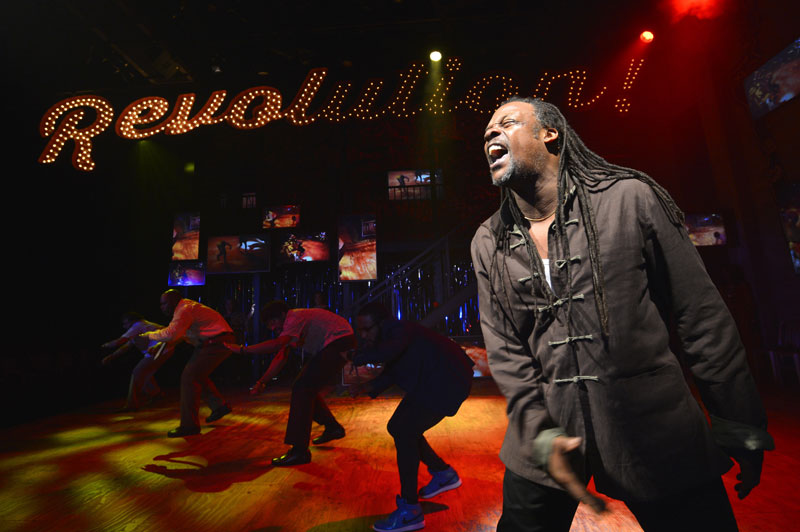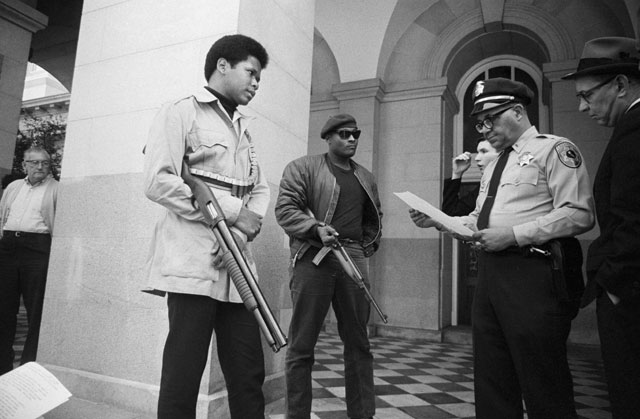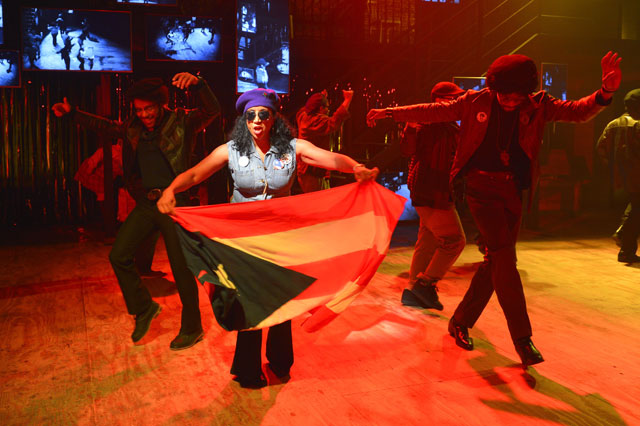Berkeley Rep’s ‘Party People’ Puts Black Panther Movement to Music

Berkeley Rep’s ‘Party People’ Puts Black Panther Movement to Music
Picture this: Thirty black men and women briefly storm the floor of the California State Assembly armed with rifles, in 1967. They’re protesting a proposed measure that would outlaw the carrying of loaded firearms in public.
That’s one lasting image of the Black Panther Party for Self-Defense, formed by Huey Newton and Bobby Seale in Oakland in 1966 as a response to what they saw as the failure of the non-violent civil rights movement. The two developed a strategy for the organization that mixed militancy with radical politics on behalf of social justice for the African American Community.
Now, Party People, a new musical about the Black Panther Party at the Berkeley Repertory Theatre, examines the history of the party and other radical groups, the ideals of their members, the oppression they faced, and some of their crimes.
“They were really united thinking they were going to change the world,” says Steven Sapp, one of the members of UNIVERSES, the New York City based theater that developed the play. Sapp’s two colleagues in Universes are his wife Mildred Ruiz Sapp, and her brother William. The three have spent the past few years interviewing former Black Panthers and their fellow radicals, The Young Lords, shaping the script for Party People, which includes composite characters based on those interviews, and preparing to star in the play.

Party People opens with a riveting 15 minutes of music, poetry, dance, and video in a kind of beat-box version of Panther history.
“Now the guns were for self-defense,” says one character. “Because the fallout from the civil rights movement was even more police brutality and oppression. And it was our legal right to defend ourselves.” The actors raise their rifles and shotguns in the air, and ask, “Do we have your attention?”
And then they pose another question that many in the white and black community asked in the late sixties, “What kind of negroes are these?”
The play shows how the Panthers’ fight for black self-determination inspired others, like the Young Lords Organization in Chicago and New York, with a goal of independence for Puerto Rico and political power for an underserved community.
UNIVERSES’ William Ruiz says the group began with a protest over erratic garbage collection in East Harlem that included piling garbage in the street to get the attention of city authorities. “The police showed up, and the garbage bags got lit on fire and made even more of a statement,” Ruiz said in a recent interview.
These black and brown revolutionaries offered free health clinics, and breakfasts for kids, but they also carried guns and watch-dogged police in sometimes bloody confrontations. And that made group members targets for local police and the FBI, which used illegal tactics, under its Counter Intelligence Program or COINTELPRO, to infiltrate the Panthers and other groups and, according to some, orchestrate the assassination of their leaders.
Ruiz-Sapp says the show has parallels with the recent events in Ferguson, Missouri. “It’s a conversation of a nation. It’s a conversation about an era, and what did that do to bring us to where we are today, and then what do we do from here?”
UNIVERSES developed Party People for the Oregon Shakespeare Festival in 2012, under the guidance of director Liesl Tommy, who’s also Berkeley Rep’s assistant artistic director. She grew up in South Africa, the daughter of anti-apartheid activists, and says she was drawn to this tale of political idealists. “I was also really moved by the journey Universes had been on, the years that they spent just listening, that is very rare and very powerful, and to let things come into their hearts and souls, and then create a piece, to me was an extremely spiritual way of making art.”
UNIVERSES has listened… One thing they noticed was the strong relationships among the Panthers and between the Panthers and the Young Lords. Ruiz recalls meeting with Young Lords founder Jose Cha Cha Jimenez in Chicago and how he introduced them to the mother of Panther Fred Hampton, who was killed by Chicago police.

“Fred Hampton’s mother greets us all warmly, and as soon as Cha Cha’s daughter walks in behind us, Fred’s mother screams out, ‘There you are baby. Why don’t you come over and visit me anymore?’ And she spanks her on the butt and makes her sit on her lap. Now this is a grown girl, 24 or 25 already. And that was a sure sign to us that they were all family to each other, that they were all fighting shoulder to shoulder for the same cause.”
Former Panther Ericka Huggins has spent hours with the members of UNIVERSES, talking about her memories of the Panthers. “It [the play] captivated me from the first moment I saw it on stage,” Huggins said during a recent interview at her East Oakland home. Huggins was 16 when she joined the Panthers, later founding the New Haven chapter.
Huggins teaches African-American history now at Merritt College in Oakland, but she’s been through a lot. Her husband John, a Panther like her, was killed in a fight allegedly incited by the FBI, and she was tried in New Haven for her role in the torture and murder of a Panther suspected of being an FBI informant. The jury deadlocked in the case, and Huggins went free.
“There isn’t a day that goes by, when I don’t remember those times,” Huggins said, “and that young man, that great young man that was killed. However I did not kill him. But harm goes deeper than that. So that’s one of the reasons I continue to do my own work.”
Huggins says she’s okay with the fact that Party People presents a fictionalized version of the events in New Haven, as well as putting the widow of a policeman, a composite character again, on stage to confront Panthers about her husband’s death. “People who are informed about their past, do well in their present moment and can impact the future,” Huggins said. And when I asked her if the play has the power to inspire young people to become more involved in politics, she added, “I think art has that power, and the play is a work of art.”
The members of UNIVERSES say they’re a little nervous about bringing this play to Berkeley, so close to the birthplace of the Panthers, and with its own history of radical politics. “I feel like every single night, there will probably be someone in that room who has experienced it all or knows it firsthand,” Steven Sapp says, “And that’s what theatre is supposed to be about, I feel. It’s supposed to be alive. There’s supposed to be an energy crackling in the room.”
Sapp says he expects Party People will thrill audience members one minute and make them deeply uncomfortable the next.
Party People runs through Nov. 16, 2014 at the Berkeley Repertory Theatre. For more information, visit berkeleyrep.org.
Funding for coverage of arts that explore social issues is provided by the California Arts Council.



